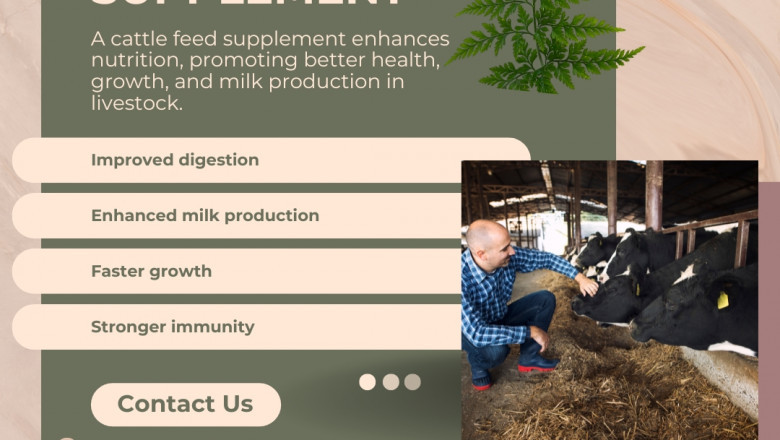views
Introduction
Cattle farming is an essential industry worldwide, providing milk, meat, and other dairy products to millions of people. Proper nutrition plays a vital role in ensuring the health, productivity, and longevity of livestock. Cattle feed supplements are designed to enhance the nutritional value of regular feed, supporting overall growth, immunity, and production efficiency. In this blog, we will explore the importance of cattle feed supplements, their benefits, types, and how to choose the right one for your herd.
Importance of Cattle Feed Supplements
A well-balanced diet is crucial for cattle to maintain good health and achieve optimal production levels. Regular feed, such as hay, grass, and grains, may not always provide sufficient nutrients required for growth, reproduction, and milk production. Cattle feed supplements help bridge these nutritional gaps by supplying essential vitamins, minerals, and proteins that enhance overall well-being.
Supplementing cattle diets not only ensures better productivity but also reduces the risk of deficiencies that could lead to diseases, lower fertility rates, and weaker immune systems.
Benefits of Cattle Feed Supplements
Cattle feed supplements provide numerous advantages for both livestock and farmers, including:
1. Enhanced Growth and Development
Quality feed supplements provide essential nutrients like proteins, amino acids, and vitamins that promote faster and healthier growth in calves and mature cattle.
2. Increased Milk Production
For dairy farmers, milk yield is a top priority. Nutrient-rich supplements help improve milk quality and increase production by supplying essential minerals such as calcium and phosphorus.
3. Stronger Immune System
A well-balanced diet with the right supplements strengthens the immune system, reducing the likelihood of diseases and infections that can hinder productivity.
4. Better Digestion and Feed Utilization
Certain supplements contain probiotics and enzymes that aid in digestion, ensuring that cattle absorb maximum nutrients from their feed.
5. Improved Fertility and Reproduction
Cattle with a proper nutritional intake have higher fertility rates, ensuring successful breeding cycles and a healthier herd.
6. Reduced Feed Wastage
By supplementing feed with highly nutritious additives, farmers can optimize feed consumption, minimizing wastage and maximizing efficiency.
Types of Cattle Feed Supplements
Cattle feed supplements come in various forms, each serving a specific purpose in livestock nutrition. Below are the most common types:
1. Protein Supplements
Protein is crucial for muscle development, growth, and milk production. Common sources of protein supplements include soybean meal, cottonseed meal, and alfalfa.
2. Mineral Supplements
Minerals such as calcium, phosphorus, magnesium, and zinc are vital for bone development, enzyme functions, and overall metabolism. Mineral licks and fortified feeds help fulfill these requirements.
3. Vitamin Supplements
Vitamins play a key role in immunity and reproductive health. Vitamin A, D, and E supplements are particularly beneficial for cattle, ensuring proper vision, bone growth, and disease resistance.
4. Energy Supplements
Cattle need adequate energy for daily activities, milk production, and reproduction. Energy supplements like molasses and grain-based products help meet these requirements.
5. Probiotics and Enzymes
These supplements improve gut health by enhancing digestion and nutrient absorption. Probiotics also help maintain a healthy balance of beneficial bacteria in the digestive tract.
6. Herbal Supplements
Herbal feed additives, such as garlic and fenugreek, improve digestion, immunity, and overall health without the use of synthetic chemicals.
How to Choose the Right Cattle Feed Supplement
Selecting the right cattle feed supplement depends on various factors, including the age, breed, and purpose of your cattle (dairy or beef production). Here are some key considerations:
1. Assess Nutritional Requirements
Understanding the specific needs of your herd is crucial. Consult a veterinarian or a livestock nutritionist to determine the essential nutrients required.
2. Choose High-Quality Supplements
opt for supplements from reputable manufacturers to ensure they are free from harmful additives and provide maximum benefits.
3. Consider Feed Composition
Check the ingredient list to ensure that the supplement contains balanced nutrients and does not include excessive fillers or artificial additives.
4. Monitor Performance and Adjust as Needed
Regularly evaluate the impact of supplements on cattle health and productivity. Adjust the dosage or type of supplement based on their response.
Best Practices for Feeding Cattle Supplements
To maximize the benefits of cattle feed supplements, follow these best practices:
- Ensure a Balanced Diet: Supplements should complement, not replace, a natural diet of grass, hay, and grains.
- Provide Clean and Fresh Water: Hydration is essential for nutrient absorption and overall cattle health.
- Feed at the Right Time: Distribute supplements at consistent intervals to maintain a stable nutritional intake.
- Avoid Overfeeding: Excessive supplementation can lead to health issues, including obesity and metabolic disorders.
- Regular Health Checkups: Monitor cattle health and consult a veterinarian if any issues arise.
Common Myths About Cattle Feed Supplements
There are several misconceptions surrounding cattle feed supplements. Let’s debunk some common myths:
Myth 1: Supplements Are Only for Sick Cattle
Fact: Healthy cattle also need supplements to maintain their overall well-being and optimize productivity.
Myth 2: All Supplements Are the Same
Fact: Different supplements serve different purposes; choosing the right one based on specific nutritional needs is essential.
Myth 3: Natural Feeds Are Enough for Cattle
Fact: While natural feeds provide essential nutrients, supplements help fill any nutritional gaps to ensure optimal health.
Myth 4: Supplements Are Expensive and Unnecessary
Fact: Investing in quality supplements reduces veterinary costs and improves overall cattle performance, making them a cost-effective choice.
Conclusion
Cattle feed supplements play a crucial role in maintaining the health, productivity, and profitability of livestock. By providing essential nutrients, these supplements enhance growth, improve milk production, strengthen immunity, and support reproductive health. Choosing the right supplements and following best feeding practices ensures maximum benefits for your cattle. For farmers looking to optimize their livestock’s performance, incorporating high-quality feed supplements is a smart and sustainable investment. Prioritize your cattle’s nutrition today with us and enjoy higher yields and healthier animals in the long run!






















Comments
0 comment